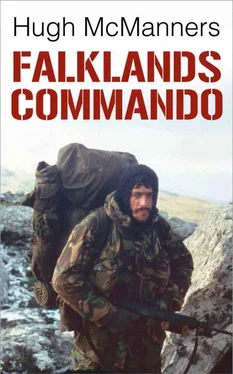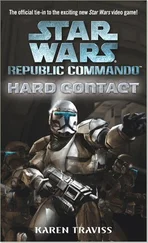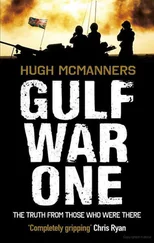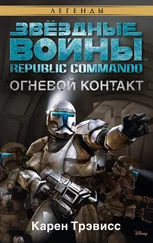Hugh McManners - Falklands Commando
Здесь есть возможность читать онлайн «Hugh McManners - Falklands Commando» весь текст электронной книги совершенно бесплатно (целиком полную версию без сокращений). В некоторых случаях можно слушать аудио, скачать через торрент в формате fb2 и присутствует краткое содержание. Город: London, Год выпуска: 2014, ISBN: 2014, Издательство: Nightstrike Publishing, Жанр: nonf_military, Биографии и Мемуары, на английском языке. Описание произведения, (предисловие) а так же отзывы посетителей доступны на портале библиотеки ЛибКат.
- Название:Falklands Commando
- Автор:
- Издательство:Nightstrike Publishing
- Жанр:
- Год:2014
- Город:London
- ISBN:978-0-992-81540-0
- Рейтинг книги:4 / 5. Голосов: 1
-
Избранное:Добавить в избранное
- Отзывы:
-
Ваша оценка:
- 80
- 1
- 2
- 3
- 4
- 5
Falklands Commando: краткое содержание, описание и аннотация
Предлагаем к чтению аннотацию, описание, краткое содержание или предисловие (зависит от того, что написал сам автор книги «Falklands Commando»). Если вы не нашли необходимую информацию о книге — напишите в комментариях, мы постараемся отыскать её.
Falklands Commando — читать онлайн бесплатно полную книгу (весь текст) целиком
Ниже представлен текст книги, разбитый по страницам. Система сохранения места последней прочитанной страницы, позволяет с удобством читать онлайн бесплатно книгу «Falklands Commando», без необходимости каждый раз заново искать на чём Вы остановились. Поставьте закладку, и сможете в любой момент перейти на страницу, на которой закончили чтение.
Интервал:
Закладка:
The ship was at its maximum capacity. Its intended war role was to move soldiers across the Channel to reinforce British units in Germany, and in peacetime to move supplies across the Channel, and soldiers to Northern Ireland. It was therefore only designed to operate at maximum capacity for a few days, but no more. However we were to be on board for an unknown number of weeks, rather than just those few days.
In the ocean swell, stumpy old Sir Percival rolled badly. At night, in order to be able to sleep at all, I put my bulky orange ships life jacket under one side of my mattress, away from the wall, so as to wedge myself inside the V between bunk and bulkhead. The lifejacket ploy saved me from the deadly sideways roll – leaving just the rocking-horse movement of the bow-to-stern axis. There wasn’t much to be done about the up-surges, which woke you in an instant of panicky weightless and then, in the nausea-creating opposite reaction, pressing you firmly down into the mattress. But this wasn’t too difficult to get used to, and sleep came reasonably easily, except for one week when we had continuous bad weather, providing seven days of grim insomnia for most of us.
During the bad weather people stayed horizontal as much as possible, keeping the headachy nausea at bay. Meals were taken by all but the most chronically affected, and eventually most found their sea legs. Some professional sailors never adapt and continue to suffer seasickness. One wonders why on earth they persist with their career. Later, down in the Falklands, on the bridge of HMS Fearless during howling storms, I was to watch with admiration, as an ashen-faced naval officer-of-the-watch crouched over the chart table to check their position, scanned the heaving horizon with binoculars, turning to peer into radar screens, periodically ducking aside to be violently sick into conveniently placed buckets – hell realised on earth I should think.
With the variety of units on board, Sir Percivale became a tribal community. The military ‘families’ stayed together: 7 (Sphinx) Commando Battery were the most complete unit on board, with all their guns, vehicles, ammunition and men. Gun batteries work, fight and play together, presenting a united front to the rest of the world. Their BC (Battery Commander) and our OC Troops, Major Gerry Akhurst, was capable, and easygoing, with a friendly magnanimity that eased us through much potential friction and strife.
‘Black Eight’ – my former gun battery, had 2/3rds of its number on board. Its nickname came from the Crimean War’s Battle of Alma during which the guns had gone ahead of the infantry to storm the heights. They’d fired so much ammunition that the faces of the gunners and the skins of their initially white horses were burned black by gunpowder.
The units formed groups for training: PT in the mornings, gunnery, weapon drills, lectures and kit preparation. This was centrally co-ordinated by Gerry Akhurst, so the ship’s very limited free spaces could be utilised fairly without hindering its smooth running.
Sir Percival ’s Captain Pitt was tremendously helpful and became a great favourite. He ended the stand-off between us swarming military officers and his reticent ship’s officers, whose routines were seriously inconvenienced by our presence. The Chinese head steward attempted to have us eat at different times, which Captain Pitt vetoed. This would have given the wily steward the opportunity to provide different menus to lessen his workload, and who knows what else besides. So we all sat down to eat together, and the ice was broken.
The sergeants had their own mess. From time to time invitations were issued – better described as Summons – for the officers to visit. One night there was the horse-racing – a traditional ship-board game where you ‘buy’ a cardboard horse in an auction using real money, which races for its owners who get the total proceeds of the auction if the horse wins. The race is run on large squares and the moves are determined by throwing the dice. There are side bets too, and normally the officers are comprehensively laundered, especially as the sergeants very ‘kindly’ agree to allow their officers to sign bar-chits to place their bets rather than using cash. We stumbled out afterwards very late, and weren’t terribly well the next day. It transpired however, that on this occasion we’d taken them to the cleaners by winning races with horses bought very cheaply, while dipping out of auctions where the bidding got out of hand.
The soldiers on board were of all shapes and sizes, from the bear-like Sergeant ‘Taxi’ Kaslyuski, who won the beard-growing competition in spite of getting fed up with its scratching and shaving it off half-way through, to the diminutive Bombardier Tulip (known as ‘Petal’) whose deadpan sense of humour usually caught me out. The guys were to a certain extent animated by events, but their excitement was tempered by having done all this before, in previous periods of international crisis.
The troop accommodation was nothing short of appalling and a nightmare for the officer responsible – Lt Bill McRae, the assistant Quartermaster of 45 Commando. A warship’s mess decks are very cramped, but these were designed only for one, or at most two night’s transit. The bunks were suspended in threes, above each other, in rows, nose to toe. There was no bedding and our sleeping bags were far too hot to use. So they were zipped up into a waterproof cover to become a cushion for the divan seat that was formed during the day by turning down the middle bunk and hooking up the top one. There was no stowage space for personal kit, and only minimal locker space.
In these desperately overcrowded conditions, hygiene was a major concern. Every night an officer accompanied by a senior non-commissioned officer (a sergeant or above) made a formal inspection known as ‘Rounds’, looking carefully at everything, especially each lavatory, sink, shower and drain. The senior hand on each mess deck was present and reported the defects in his section. This daily inventory allowed us to pressurise the already harassed ship’s engineers. Delays in making repairs could lead to infections, food poisoning or outbreaks of disease – problems unfamiliar to us in the 20 thcentury, but the major cause of deaths in previous military campaigns.
The air-conditioning had never been needed on the European runs so had fallen into disuse, and then when required did not work. Once we entered the tropics the fresh water was turned off, restricted to just 30 minutes per day because the ship’s seawater converter couldn’t cope. The normal naval rules for using a shower are to turn on and wet oneself, turn off and soap up, and then turn on briefly to rinse off. Even so we were running short by the time we reached Ascension. The only way to get a drink was to keep your water bottles and other containers filled whenever the water was on.
This seething mass of humanity was further subjugated 24/7 by ‘pipes’ from the ship’s omnipresent tannoy system, operated from the guardroom. The duty NCO made the ‘pipes’, which were very loud, intrusive and often distorted – like most British Rail Guards. If his accent was particularly strong, or when he didn’t understand the message, the noise was incomprehensible. This awful voice would cut into conversations, sleep and one’s inner-most thoughts. Worse, they would cut-out the World Service news reports on whose every word we hung, with pointless announcements.
Piped announcements are an unfortunate part of life in warships (and astonishingly also RAF Officers Messes). Later in this crisis, once battle was joined and people working watches needed to sleep during the day, there was an end to this piping of trivia. Thirty years later, I still have a strong dislike of any loudspeaker system used in this lazy, thoughtless and intrusive way.
Читать дальшеИнтервал:
Закладка:
Похожие книги на «Falklands Commando»
Представляем Вашему вниманию похожие книги на «Falklands Commando» списком для выбора. Мы отобрали схожую по названию и смыслу литературу в надежде предоставить читателям больше вариантов отыскать новые, интересные, ещё непрочитанные произведения.
Обсуждение, отзывы о книге «Falklands Commando» и просто собственные мнения читателей. Оставьте ваши комментарии, напишите, что Вы думаете о произведении, его смысле или главных героях. Укажите что конкретно понравилось, а что нет, и почему Вы так считаете.












